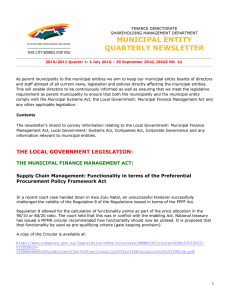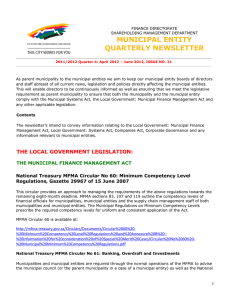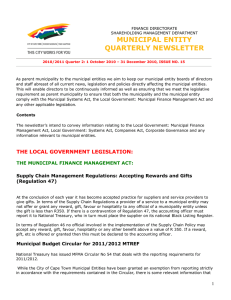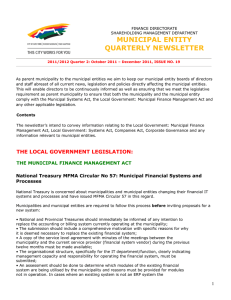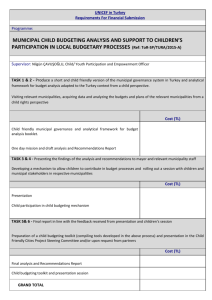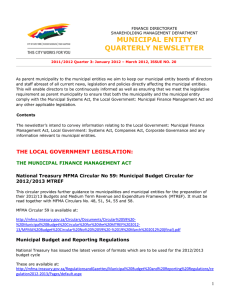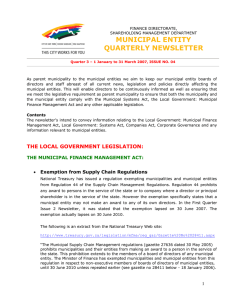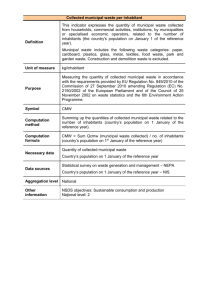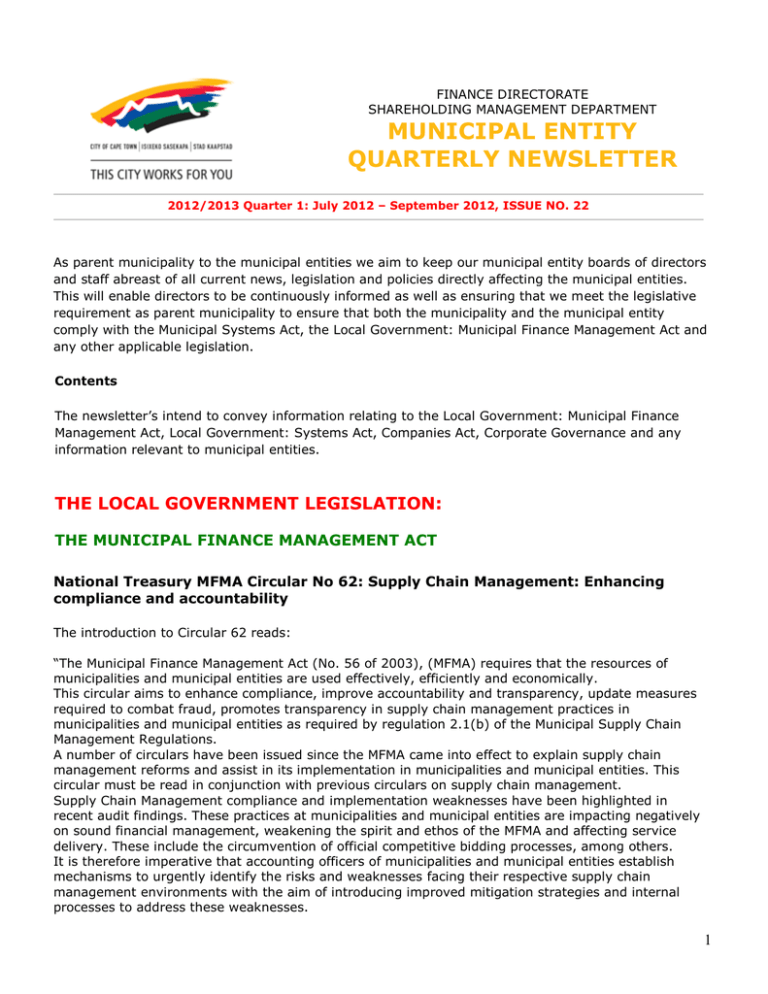
FINANCE DIRECTORATE
SHAREHOLDING MANAGEMENT DEPARTMENT
MUNICIPAL ENTITY
QUARTERLY NEWSLETTER
Analyst
2012/2013 Quarter 1: July 2012 – September 2012, ISSUE NO. 22
As parent municipality to the municipal entities we aim to keep our municipal entity boards of directors
and staff abreast of all current news, legislation and policies directly affecting the municipal entities.
This will enable directors to be continuously informed as well as ensuring that we meet the legislative
requirement as parent municipality to ensure that both the municipality and the municipal entity
comply with the Municipal Systems Act, the Local Government: Municipal Finance Management Act and
any other applicable legislation.
Contents
The newsletter’s intend to convey information relating to the Local Government: Municipal Finance
Management Act, Local Government: Systems Act, Companies Act, Corporate Governance and any
information relevant to municipal entities.
THE LOCAL GOVERNMENT LEGISLATION:
THE MUNICIPAL FINANCE MANAGEMENT ACT
National Treasury MFMA Circular No 62: Supply Chain Management: Enhancing
compliance and accountability
The introduction to Circular 62 reads:
“The Municipal Finance Management Act (No. 56 of 2003), (MFMA) requires that the resources of
municipalities and municipal entities are used effectively, efficiently and economically.
This circular aims to enhance compliance, improve accountability and transparency, update measures
required to combat fraud, promotes transparency in supply chain management practices in
municipalities and municipal entities as required by regulation 2.1(b) of the Municipal Supply Chain
Management Regulations.
A number of circulars have been issued since the MFMA came into effect to explain supply chain
management reforms and assist in its implementation in municipalities and municipal entities. This
circular must be read in conjunction with previous circulars on supply chain management.
Supply Chain Management compliance and implementation weaknesses have been highlighted in
recent audit findings. These practices at municipalities and municipal entities are impacting negatively
on sound financial management, weakening the spirit and ethos of the MFMA and affecting service
delivery. These include the circumvention of official competitive bidding processes, among others.
It is therefore imperative that accounting officers of municipalities and municipal entities establish
mechanisms to urgently identify the risks and weaknesses facing their respective supply chain
management environments with the aim of introducing improved mitigation strategies and internal
processes to address these weaknesses.
1
It must be emphasized that the relevant treasuries are committed to assisting municipalities and
municipal entities to improve the status of their financial management.
Government has also elevated the combating and prevention of corruption as an output in Outcome 12.
The Minister of Finance has therefore established a Multi-Agency Working Group to coordinate and
investigate corruption related to supply chain management practices across government.
The measures below are therefore intended to provide municipalities and municipal entities with
guidelines to improve accountability and transparency and to ensure value for money in the
procurement of goods, services and/or infrastructure projects.”
MFMA Circular 62 is available at:
http://mfma.treasury.gov.za/Circulars/Pages/Circular62.aspx
National Treasury MFMA Circular No 63
The aim of this circular is to provide guidance to municipalities and municipal entities on the new
Annual Report Format and its contents. Information included in the New Annual Report will better
inform in a standardised framework how municipalities and municipal entities have performed, by
providing information of a financial and non-financial nature in one document.
The Circular is available at:
http://mfma.treasury.gov.za/Circulars/Documents/Circular%2063%20–
%20Annual%20Report%20Update%20–%2026%20September%202012/MFMA%20%20Annual%20Report%20Circular%2063%20-%2026%20September%202012.pdf
Draft Financial Misconduct Regulations
National treasury has published draft Financial Misconduct Regulations in response to the AuditorGeneral highlighting a number of issues in the Consolidated Report on Local Government. These issues
includes, among others, non-adherence to financial management policies and precepts, as well as the
need to improve governance arrangements. A significant number of municipalities have incurred
unauthorised, irregular as well as fruitless and wasteful expenditure.
The regulations on financial misconduct will support measures to expeditiously address contraventions
of financial misconduct and mismanagement.
The objective of the Financial Misconduct regulations is to set out processes and procedures those
municipalities and entities must follow when dealing with financial misconduct. The regulations will
apply to both all officials and office bearers within municipalities and municipal entities.
The draft Financial Misconduct Regulations may be viewed at:
http://mfma.treasury.gov.za/6048219A-1E38-46C0-9820-48605D64B9D7/FinalDownload/DownloadId904DA51E2D80FE15E6486D0DEE479C58/6048219A-1E38-46C0-982048605D64B9D7/MFMA/Regulations%20and%20Gazettes/Draft%20MFMA%20Financial%20Misconduct
%20Regulations%2013%20July%202012.pdf
Guide to the Municipal Asset Transfer Regulations
This guide was developed by National Treasury to assist municipalities and municipal entities in the
implementation of the Municipal Asset Transfer Regulations.
2
The guide can be accessed at:
http://mfma.treasury.gov.za/MFMA/Guidelines/Asset%20Transfer%20Guide.pdf
Press Release: State of Municipal Revenue and Expenditure 2011/2012
National Treasury has released a press statement on the state of Local Government Revenue and
Expenditure for the period: 1 July 2011 – 30 June.
http://www.treasury.gov.za/comm_media/press/2012/2012083101.pdf
Minimum Competency Level Regulations: Reporting Requirements
Regulation 14 of the Regulations on Minimum Competency Levels requires the Chief Executive Officer
of municipal entities to report to the parent municipality on its compliance with the Regulations by the
20 July and 2o January each year.
GENERAL:
CONVERSION OF PAR VALUE SHARES TO NO PAR VALUE SHARES:
SUBSTITUTIVE SHARE-FOR-SHARE TRANSACTIONS
[Source: Danielle le Roux, Cliffe Dekker Hofmeyr – Tax Alert: 20 July 2012]
“In a recent binding class ruling regarding the conversion of ordinary par value shares to no par value
shares, as directed under item 6 of Schedule 5, read with Regulation 31 of the Companies Act, No 71
of 2008 (Companies Act), SARS ruled that there will be "no disposal" on conversion for the
shareholders as contemplated in paragraph 11(1)(a) of the Eighth Schedule to the Income Tax Act, No
58 of 1962 (Act). SARS further ruled that there will be no 'receipt' or 'accrual' for the shareholders
under the definition of gross income in s1 of the Act, provided the converted shares are held on
revenue account. Finally, the ruling provided that the conversion will not be a 'transfer' under s1 of the
Securities Transfer Tax Act, No 25 of 2007. This ruling was obtained subject to the rights relating to
the Applicant’s shares remaining unchanged, as envisaged by item 6 of Regulation 31 of the
Companies Act.
The draft Taxation Laws Amendment Bill, 2012 also proposes to insert provisions regulating, among
others, the mandatory conversion of par value shares to shares of no par value as required under the
Companies Act. These provisions are to be inserted under s43 of the Act. The rationale behind these
provisions is that current rollover relief for recapitalisations is too narrow and not in line with the
reorganisation rules, as the relief does not currently apply to shares held as trading stock and the
permissible types are share consideration are too narrow, not making provision for share splits,
consolidations or conversions. The change is also necessitated by the removal of par value shares
under the Companies Act.
Under the proposed s43, the required conversion of shares under the Companies Act will fall under the
definition of a "substitutive share-for-share transaction" and will not be treated as a deemed disposal
event, the base cost remaining the same.
With the introduction of s43, taxpayers will no longer be advised to apply for a ruling regarding the
consequences of a conversion of shares in terms of the Companies Act, as the tax consequences will be
regulated by s43, should the draft provision be enacted.”
PWC Executive directors – Practices and remuneration trends report 2012
In this publication, PWC report on the trends in the remuneration paid to executive directors. In
addition, PWC have provided some insight on shareholder and institutional investor sentiment with
3
regard to executive remuneration and discuss what is in the pipeline globally in terms of remuneration
governance legislation.
The PWC article can be accessed at:
http://www.pwc.co.za/en/publications/executive-directors-report.jhtml
PWC Survey: Making it Happen
The PWC survey shows that municipalities appear to be reaching out to their external stakeholders
when formulating their visions and implementing their strategies. For example, most municipalities in
the survey reported the need to partner corroboratively with private (89%), public (81%) and
voluntary (58%) sector organisations to deliver their strategies.
The survey can be accessed at:
http://www.pwc.co.za/en/publications/making-it-happen.jhtml
Please contact Louise Muller (021 4003940) or Richard Wootton (021 4002701) if you have any queries
in respect of this newsletter.
Although every effort is made to check the accuracy and quality of the information supplied, The City
cannot be held responsible for any errors that may arise.
Copyright: City of Cape Town 2012. All rights reserved. No part of this newsletter may be reproduced or transmitted in any form without
written permission from the City of Cape Town, Finance Directorate, Shareholding Management Department.
4

